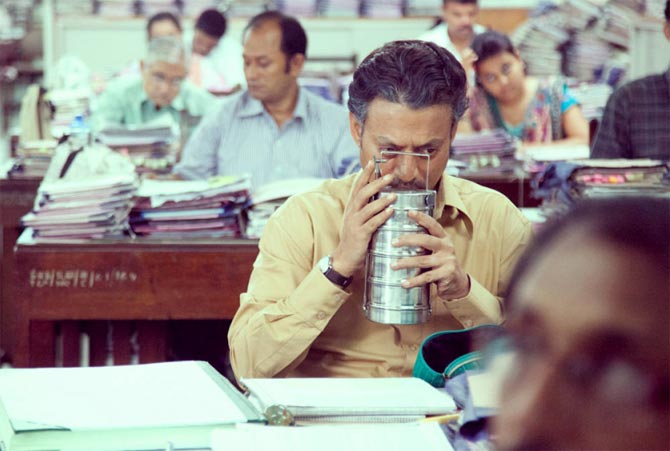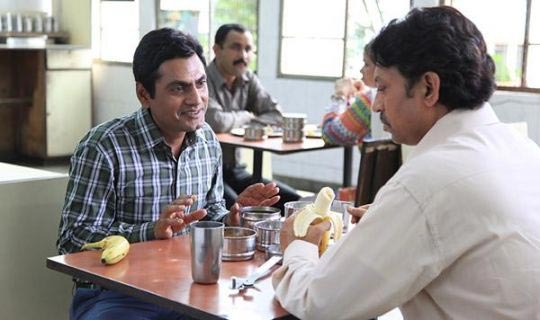 | « Back to article | Print this article |
'Anurag Kashyap is a father figure. I am his rebel daughter'
'We are at an amazing stage now in terms of the kind of content that is being generated and the filmmakers who are unapologetic about what they make. They don't belong to film families.'
'So what Kaizad Gustad and Nagesh Kukunoor started -- at that time every year there would be one film. Then with Gulaal, Dev D, Khosla Ka Ghosla every three to four months, there would be a new film.'
'Now there is one film every month and turning the box office around. Films like Madras Café and Kai Po Che are doing good business. We are living in terrific times.'
Meet one of India's most successful producers, Guneet Monga, 30.
At the start of the Berlin Film Festival earlier this year, Variety magazine announced that producers Guneet Monga and Karan Johar had bought the remake rights to the hit French film Intouchables.
This would be the second joint project for Monga -- a leading independent film producer in India -- and Johar, who is best known for big budget Bollywood productions.
Last year, Johar decided to 'present' Ritesh Batra's The Lunchbox and he spent considerable time promoting the film. Monga was the lead producer on that film, and is her biggest success story so far.
The film opened the Dharamsala International Film Festival last year. The prime minister of the Tibetan Government in Exile was so impressed with the film that he arranged for Monga to have a private meeting with the Dalai Lama.
That now seems like just another day in the life of the talented Monga.
Her life is filled with a lot of hard work -- she has gone from an intern in Delhi to becoming one of the most sought after Indian producers, working closely with her mentor and business partner Anurag Kashyap.
Last year, India Today listed her in its 40 leaders of tomorrow list from across all industries.
The Hollywood Reporter listed Monga, who is 30 years old, as one of the 12 power women making waves worldwide.
Aseem Chhabra recently spoke to the trailblazing producer about her journey and where she has reached in a relatively short period.
Please click NEXT to read further.
'I would interrupt people's conversations and drop post cards on their table'
Do you remember the first film festival you attended?
That was in 2009 with The Girl in Yellow Boots at the Venice Film Festival.
And I read someplace that in Venice you went about walking with…
...posters on our back.
You had a few other people with you?
Yes, all the ADs (assistant directors), who had worked with Anurag (Kashyap, the film's director), came along. I blackmailed them to be human posters for publicity. We stapled posters on the back of our shirts and we kept walking shamelessly across the Lido area.
I would interrupt people's conversations and drop post cards on their table. It was shameless marketing.
I didn't know how much to bring in terms of publicity material. I ended up printing like 5,000 postcards, visiting cards and stationery.
'As an intern, I had once gone to receive Anurag Kashyap from the airport but he doesn't remember that'
This is fascinating story. I wanted to go back to how you started with films. You are from Delhi and you had no family background in films. Pan Nalin (director of Samsara) told me that you first worked with him.
I was an intern on Valley of Flowers and Anurag wrote the dialogues for the film. I had once gone to pick him up from the airport. He doesn't remember any of that. He never spoke to me. But I remember picking him up and being his runner.
I got the job because my best friend's mother was the production coordinator on the film. And I kind of followed her everywhere to get me a job in Delhi. I wanted to be a production coordinator because I had seen her do that.
I was the first intern they hired.
Did you go to Ladakh for the shoot?
I was there for a few days. I landed there on August 15, 2004 and the same day I got a call that my mom was detected with cancer.
But everyone was very supportive and suggested that I should go back to the Delhi office and work from there. I moved back to Delhi. My mother passed away in 2008.
I am sorry to hear that. So when does Anurag remember you from?
That was with Dasvidaniya (2008), which I had produced.
Was that your first film as producer?
No, second. I had produced Subhash Kapoor's Say Salaam India before that. We kind of self-distributed the film.
'It was in Partition that I really learned line production'
Between the internship and producing Subhash’s film, what did you do?
I was a production coordinator on a Canadian film. I also worked on a lot of BBC short films -- often line production work for shooting in Rajasthan or getting I&B Ministry's permission. All that work was based in Delhi. I didn't know anything about Mumbai.
Also, in 2006, Vic Sarin (Canadian Indian filmmaker) came to India to make Partition (with Irrfan Khan and Jimi Mistry) and he contacted me.
It was in Partition that I really learned line production. I was in my early 20s and Vic trusted me with the money and executing the project. There I got to know Harish Amin who was the production manager on the film and he asked me to move to Mumbai so I could produce on my own.
What did you work on with Harish?
That was Say Salaam India.
What year was that?
It must have been 2006. I kept moving back and forth between Delhi and Mumbai since my mother was unwell.
Around that time, I started to work on Ketan Mehta's Rang Rasiya.
Ketan and Deepa (Sahi) started an organisation called Indian Independent Filmmakers Worldwide. I joined as a volunteer. That organisation has people like Anurag, Raja Menon and Sudhir Mishra.
They would meet every second Saturday and talk about how independent cinema can go forward over beer and biryani. That's where I started interacting with Anurag for the first time.
I remember when Vinay Pathak called me.
We had met in Delhi when he was acting in a foreign film. He said "It is time I can now ask you to produce my film."
I remember reading the script of Dasvidaniya with my mom in the hospital. I lost her in between the shoot of the film, but she heard the song Meri Maa (sung by Kailash Kher).
'A friend suggested I could do line producing again, but after Dasvidaniya I had no energy'
Are you an only child?
Yes. I lost my mother in July 2008. Dasvidaniya released in November and in February 2009, I lost my father.
Those were difficult years.
When the film opened, we were at the bottom of cash flow. Some financers ran away and Vinay and I pooled in our own money to finish and finalise all the payments. We were happy that the film released but we had a terrible time with the finances.
I slept for seven days after my father passed away.
I didn't wake up.
I didn't know what to do.
A friend suggested I could do line producing again, but after Dasvidaniya I had no energy. My friend suggested I should work on Once Upon a Time in Mumbaai for Balaji.
The CEO there -- Ekta Kapoor -- asked me what I wanted to do and I said I wanted to wake up in the morning and do fun work. So I line produced that film and Ekta was very nice.
Anurag had just finished Dev D and many producers were meeting him. He came to the Balaji office and we met there again. He asked if I would like to work with him.
For a week, I would finish work at Balaji at five and then go to Anurag's office to figure out what they were doing.
They had started to work on Yellow Boots. I loved the script and Anurag's energy. At any given time, he had 10-15 people working there -- all ADs, but everybody multitasking, from making tea, to writing scripts and shooting second unit.
'For me, it was never about salary'
Had you seen that kind of energy anywhere else?
No. That is what Anurag generates. He cultivates that. He cannot help being a mentor. He is a genuine workaholic. His energy level was unreal.
In fact, when I came into that space, everyone had scripts ready. So I started putting them in boxes and started finding money for each one of them and that resulted in so many films.
So within a week of spending time at Anurag's office, I moved there full time from Balaji.
And you became a salaried employ there?
For me, it was never about salary. It was about 'let's do something and figure out where we go from here.'
I had some savings that my parents had left for me. So I could afford to be there and learn things. My mom and I had formed a company called Sikhya Entertainment -- which means to learn.
So that is your company. And how is it different from Anurag’s company?
Now he has two companies -- Anurag Kashyap Films Private Limited and Phantom Films.
Sikhya is a new label under which we are also producing films. It's co-owned by Anurag and me. I moved my mom's shares to Anurag. He is still a father figure. I am his rebel daughter (laughs).
'There were so many people we were in love with'
How did that work out?
At one point, we had Monsoon Shootout (Monga sold her Delhi house to finance this film), Peddlers, Aiyyaa and Tasher Desh happening at the same time.
We were too small to run four productions simultaneously. At the same time, Gangs of Wasseypur and Shaitan were happening. Michael was being made somewhere else and we partnered into that.
There were at least 30 short films made in that time.
Most of those films have done well, played at festivals, but did you not want to focus on one or two films at a time?
There were so many people we were in love with. What do you do?
Weren't your resources and energy level limited?
Not at that time.
I do feel now that what we did in the last three or four years, it can't be recreated at that level. And now things have become calculated and planned. But at that time, it was my mistake. I genuinely did not know what it meant to do one thing at a time.
I was always like why can't this happen? Of course it can happen. I would set up a parallel team.
I have amazing line producers who work with me. Now it is all planned, even when we travel internationally. It is a powerful team. Everyone is super young and an entrepreneur.
'I really wanted to learn the craft'
Are you doing things differently now?
Yes, we have gotten to a point where we do one thing at a time (laughs).
Primarily productions are happening under Sikhya and Phantom. AKFPL we will use as a brand, if we release films that Anurag wants to lend his name to.
So how many films did you produce under these banners?
Seventeen, starting with That Girl In Yellow Boots. Anurag had produced Udaan. I joined him after that.
So the next step of taking them to film festivals, how did that happen?
I was studying film festivals and was a part of many producers' labs.
I really wanted to learn the craft. With Anurag what happens is that he and all his directors -- like Vasan Bala, Bijoy Nambiar and Shlok Sharma -- are self-sufficient. But I could add value to that with cash flow management and now I am dealing more with the strategy point of view.
I got time to study and move around the world. Anurag was very supportive. I did the IFP mentor, TAP (Trans Atlantic Partner) training, where they train you over three weeks in Berlin, Halifax and New York.
It is a very practical study of working producers and the problems we face around the world, issues like what is a co-production and legal factors. How the sales agents operate and how the contracts was written?
There has been a lot of parallel conversations and education. Sundance was very supportive to The Lunchbox.
I have gotten the most out of the NFDC lab in Goa. They fly people like Marco Muller (Rome Film Festival Director) and I have had him for a mentor. I have gone up to them and been very curious and asked questions. It is amazing how open people are outside India where you ask questions and you get time with them.
'Anurag sees six films in a day and I do 25 meetings in a day'
You have put together quite an amazing team of producers for The Lunchbox, including Bosnian filmmaker Danis Tanovic.
He is one of the coolest filmmakers. He is so supportive and I have learned so much from him. Sikhya is producing his new film.
There is really no one else in your generation who was learning all this?
No. I think Anurag opened up a world for me and I kind of found my way in it. He is a film fanatic and he would travel to festivals to see films.
And sometimes I would say I don't get to see films and I don't get to have those conversations about cinema and directors. One day I said to Anurag 'I don't know as much about world cinema as you do,' and he responded by saying 'That's why there are two of us.'
But you have a sense of films -- the ones you are producing.
Of course I do.
When was the last time you went to a film festival and saw a film?
Ah... Anurag sees six films in a day and I do 25 meetings in a day.
When was the last time you saw a film that you did not produce?
In Mumbai, I see films every Friday. But in Cannes last year, I saw Only God Forgives.
So where are you now as a producer and where do you see Indian indie cinema?
It's amazing to look at the world in totality and not limit yourself to one country.
We are at an amazing stage right now in terms of the kind of content that is being generated and the filmmakers who are unapologetic about what they make. They don't belong to film families. It is such an important phase.
So what Kaizad Gustad and Nagesh Kukunoor started -- at that time every year there would be one film. Then with Gulaal, Dev D, Khosla Ka Ghosla every three to four months, there would be a new film.
Now there is one film every month and turning the box office around. Films like Madras Café and Kai Po Che are doing good business. So we are living in terrific times.
'The Indian independent world is more accepted now'
When you talk to other producers in India, how do you see yourself different from them?
They don't understand what I do. They ask me why I do it since there's no money in it.
I tell them that Monsoon Wedding made $32 million around the world and A Separation made nine million euros in France. There is no precedence. No Indian film has gone so far. I hope The Lunchbox does.
A friend told me that last year everyone wanted to meet you at Cannes.
(Laughs). My challenge five years ago was that I would walk into a meeting and they would say Bollywood.
At least now they understand the kind of films we are making. I know there are some from our production house, but there is Miss Lovely and Ship of Theseus.
Now the fact the Indian independent world is more accepted. It’s a slow transformation but I am noticing it.
The Lunchbox turned out to be your biggest success in some ways.
(Director) Ritesh Batra came with an interesting background, from an NYU student to an employee of Tribeca and Doha film festivals. He has a worldview of how an independent film is done. He's an exceptionally good writer and director.
It has sold around the world. A lot of credit for that goes to Ritesh. Both he and I had a lot of information and knowledge, and both of us together were like a house on fire.









